The International Day of the Disappeared, recognized annually on August 30th, serves as a poignant reminder of the hundreds of thousands of individuals missing worldwide, a tragic consequence of armed conflict, violence, disasters, and migration. The International Committee of the Red Cross (ICRC) estimates that by the end of 2024, over 284,000 people globally were registered as missing with the Family Links Network of the International Red Cross and Red Crescent Movement. This figure represents only a fraction of the actual number of missing persons, as many cases go unreported or undocumented. These disappearances leave families shattered, perpetually searching for answers and closure, often enduring a lifetime of uncertainty and suffering. The Day of the Disappeared provides an opportunity to acknowledge the plight of these families and to advocate for greater efforts in tracing missing persons and supporting their loved ones.
The impact of disappearances extends far beyond individual families, disrupting the fabric of communities, hindering reconciliation processes, and impeding social and economic progress. The ICRC emphasizes the importance of addressing this issue comprehensively, recognizing its far-reaching consequences for societies grappling with conflict and instability. In regions like Nigeria, where the ICRC has registered approximately 24,000 active cases of missing persons since 2014, the scale of the problem is particularly acute. This figure represents the ICRC’s highest caseload in Africa, and alarmingly, more than half of these missing individuals were children at the time of their disappearance. The ongoing conflict in the region, marked by violence and displacement, has contributed significantly to the high number of missing persons, highlighting the urgent need for intensified efforts to locate them and reunite them with their families.
The Maiduguri field office of the ICRC organized a gathering to commemorate the International Day of the Disappeared, bringing together families of the missing, community members, and government representatives. Diana Japaridza, Head of Sub Delegation at the ICRC Maiduguri Field Office, expressed the organization’s commitment to supporting families of the missing and advocating for their needs. She highlighted the devastating and long-lasting impact of disappearances on families and communities, emphasizing the need for collective action to address this humanitarian crisis. Japaridza underscored the ICRC’s efforts in registering missing persons, facilitating the exchange of information between families and authorities, and providing psychosocial support to those affected.
The event served as a platform for families to share their experiences, express their grief, and renew their hope for answers. The gathering also aimed to raise awareness within the community and among authorities about the plight of families of the missing, urging greater support and resources for tracing efforts. The ICRC stressed the importance of collaboration between government agencies, humanitarian organizations, and community groups in addressing the issue of missing persons effectively. Japaridza called on all stakeholders to work together to ensure that families receive the answers they deserve and that the missing are not forgotten.
Lawal Wakilbe, the state Commissioner for Education, expressed deep concern for the families of the missing and pledged his ministry’s support. Representing Governor Babagana Zulum, Hajiya Zainab Mustapha, a Senior Special Assistant on education, echoed the commissioner’s sentiments and encouraged the families to persevere in their search for their loved ones. The presence of government officials at the event demonstrated a commitment to addressing the issue of missing persons and supporting the affected families. Their words of encouragement and support provided a glimmer of hope to those enduring the agonizing uncertainty of not knowing the fate of their missing family members.
The International Day of the Disappeared stands as a solemn reminder of the human cost of conflict, violence, and disaster. The hundreds of thousands of missing persons worldwide represent a profound humanitarian crisis, leaving countless families in anguish and uncertainty. Events like the gathering in Maiduguri offer a space for families to connect, share their stories, and find strength in collective action. The ICRC, alongside other humanitarian organizations and government agencies, remains dedicated to working tirelessly to trace missing persons, support their families, and advocate for greater attention to this critical issue. The Day of the Disappeared serves as a call to action, urging renewed efforts to bring closure to the families of the missing and to prevent future disappearances.


